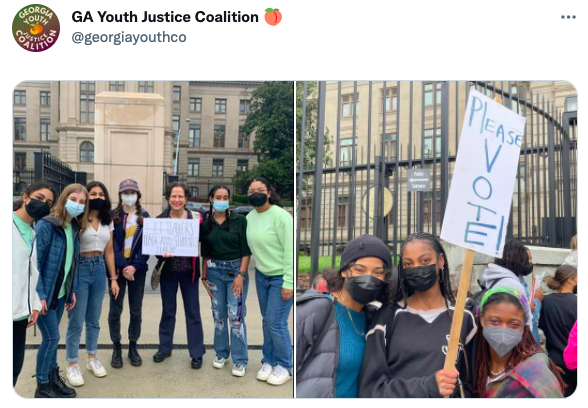Georgia’s Teens Take the Fight to Atlanta
“We work at what we call the intersection of public education and democracy.”


[Twitter/georgiayouthco]
In the very near future, voters in two Democratic strongholds in Georgia could wake up to find themselves represented by QAnon-promoting Trump acolyte Marjorie Taylor Greene.
If this happens, it will represent a victory for Republican legislators who have redrawn the state district maps to maximize their party’s impact. It will also be a major loss for the voters who don’t share those beliefs – including a disproportionate number of people of color.
Redistricting is one of the many issues on the agenda for the Georgia Youth Justice Coalition, a youth-led association that organizes young people around political issues like public education, the climate crisis, abortion and voting rights, and teaches them about state legislative processes so that they can get directly involved. I spoke with GYJC organizer and recent high school graduate Yana Batra about how the coalition is bringing more people into politics, and what this might mean for Georgia.
This interview has been edited for length and clarity.
Tell me about the GYJC and what your aims are.
We are a group of 40 or 50 organizers, all between the ages of 14 and 23. We're all students, and we're all Georgians, from counties all across the state. Many of us are students of color. Many of us are first-generation American or low-income. We work at what we call the intersection of public education and democracy – on issues like redistricting, making sure that our high schools don't have lead pipes and ensuring that our representatives actually reflect the communities that they come from.
How did redistricting become an issue that rose to the fore for you?
The thing is, redistricting happens every 10 years, and it affects literally every issue that a young person might care about. We call it a bottleneck issue.
For example, I am about to go to school at Georgia Tech, which is divided between two state Senate districts, 36 and 39. Georgia Tech is the third-largest college in the state. But because its representation is divided, parts of the campus vote in different locations, and so members of the community aren't able to effectively lobby their legislators to meet the needs of their community, for instance, around transit or housing. The same is true for all kinds of minority communities. Without contiguous representation, these communities are denied the ability to advocate for their interests.
What has it been like trying to organize young people around redistricting?
Redistricting is difficult to mobilize people around since it’s such an abstract concept and it comes up so infrequently. So, in galvanizing young people we had two questions: One, how do we bring media attention to the issue so that we can pressure representatives to actually draw fair maps? And two, how can we organize young people who are not very aware of or educated on what redistricting is and how it happens?
Our main tactic was to get young people to testify at the state legislators’ redistricting town hall. Because we wanted folks from all across the state – and especially from at-risk and diverse communities – to feel prepared and comfortable fighting for fair representation, our challenge was partly to educate folks, but also to teach them the skills required to take up space at a town hall. This is very hard for young people to do, because we're often told that we aren’t old enough or experienced enough, or that we don't know enough. That's one of the biggest challenges in all forms of organizing, actually: showing young people that they have the skills and the right to make change for themselves.
Are there any recent success stories that the coalition is particularly proud of?
Yeah, we're proud of a lot of the work that we did over the legislative session. We were able to kill quite a few bills that would have defunded, limited or placed restrictions on schools in which teachers can discuss race and racism in the classroom. We also managed to kill a couple of transgender athlete bans, although unfortunately, the Georgia High School Association [which governs high school sports in the state] just voted nearly unanimously to ban transgender athletes from participating on teams that align with their gender identity.
We’re also celebrating the fact that for the first time in 19 years, public education in Georgia is fully funded, according to the Quality Basic Education formula. The QBE dictates the basic level of funding that Georgia schools need in order to meet the minimum level of quality for students. The entire time I’ve been alive, my schools haven’t received full state funding. But this year, thanks to a lot of surplus money from last year's budgets, from COVID relief funds and just the fact that Georgia is pretty flush with money right now, the QBE was finally fully funded. So that is a really gratifying win.
That's great. And what are the coalition's ambitions in the future?
This summer, we are working on building momentum ahead of the next legislative session. Students are much more available in the summer, so we can really grind.
We’re creating a network of Black student unions; Georgia is an amazing powerhouse of student organizing, our historically Black colleges and universities are amazing powerhouses of student organizing, and we want to make sure that our high schools are too.
We also want to work against the political violence that many young people are experiencing. I have friends in Forsyth County who went to a school board meeting to speak about their right to learn real, unabridged, unfalsified history in their classrooms, and they received online threats of physical violence from adults and parents in their community. Democracy cannot exist when adults are literally threatening to beat up students.
Finally, we recognize that bringing people into GYJC looks like making space and training people to feel comfortable and feel like they have the skills to effectively organize. We've done training programs in which we trained folks to be comfortable with the legislative processes in Georgia so that they could go work as legislative staffers or on campaigns, and be equipped to not only support candidates and legislators, but also to advocate for themselves.
You might also enjoy
What's Your Reaction?



















